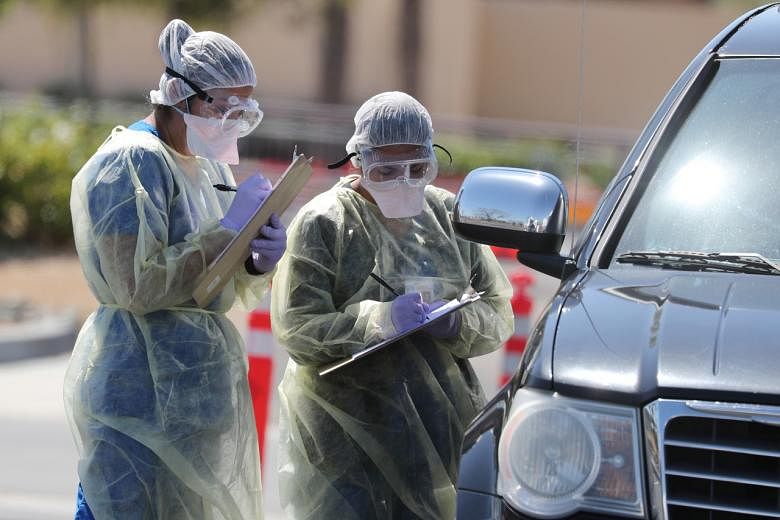WASHINGTON - The United States overtook China and Italy to become the country with the most confirmed Covid-19 cases on Thursday (March 26), putting it on course to become the new epicentre of the pandemic, in line with previous warnings from the World Health Organisation.
Official numbers lag behind, but a Johns Hopkins University tracker recorded the number of confirmed cases in the US at 85,400 as of Thursday night, while a New York Times tally totalled up to 83,300 cases. At least 1,200 deaths have been linked to the outbreak.
While the virus first emerged in China in late December last year, the US - the world's third-most populous country - recorded its first known case in the state of Washington on Jan 22, and cases started surging only this month.
Confirmed cases on Thursday were nearly double what they were three days ago, a grim acceleration which underscored America's underpreparedness to deal with an epidemic that spread relatively later within its borders than in other nations.
America was slow to ramp up testing for the broader population, and personal protective equipment like masks and medical equipment including ventilators remain in short supply in many hospitals around the country.
The New York metropolitan area, where more than half of America's coronavirus cases are coming from, is now experiencing a surge of Covid-19 patients and deaths. Medical professionals have taken to social media to share stories of besieged hospitals and sound the alarm about having to care for patients without enough protective equipment.
In one video, emergency room doctor Colleen Smith of Elmhurst Hospital in Queens, New York, said she had to reuse her N95 mask for days, and described how her hospital had to beg for ventilators.
"We had to get a refrigerated truck to store the bodies of patients who are dying," said Dr Smith in the video as she showed the truck, parked in an alley behind two dumpsters.
She added: "From our perspective, everything is not fine. I don't have the support that I need and even just the materials that I need physically to take care of my patients. We're America, we're supposed to be a first world country."
Almost half of America's 330 million people have been told to stay home or had their movement restricted in some way, to curb the spread of the coronavirus. Once-crowded streets are unsettlingly empty, and some shop fronts have been boarded up to prevent possible looting.
But the ordered closure of businesses has also led to millions being laid off and industries severely disrupted, with Congress working on a historic US$2.2 trillion ($3.1 trillion) relief package to alleviate the economic suffering.
In the week ended March 21, a total of 3.28 million people filed for unemployment insurance, a more than 10-fold increase from two weeks earlier before businesses were shuttered.
President Donald Trump said in a letter to governors on Thursday that he wanted to label counties according to their levels of risk, so that local policymakers could maintain, increase or relax the social distancing measures they had in place.
The President, who has been criticised for downplaying the seriousness of the epidemic in its early days, has repeatedly said he wants to reopen the economy despite warnings from public health experts that relaxing social distancing measures too early could lead to an explosion in cases.
Beyond New York, New Orleans is also grappling with a fast-growing outbreak, while White House coronavirus response coordinator Deborah Birx also warned of new hot spots emerging in counties in Michigan and Chicago.
But Dr Birx also reassured reporters at Thursday's press conference that models showing that 20 per cent of the population could be infected were not matched by data.
However, Harvard University epidemiology professor Marc Lipsitch said that the virus could spread rapidly, as seen in countries around the world.
America also remained woefully behind on testing capacity and had not accomplished contact tracing on a scale that was needed, he added on Twitter.
"I desperately hope she (Dr Birx) is right, because much suffering will be avoided. But reassurance that this is likely, or even plausible, with the disorganised track record of the US response, is false reassurance," said Prof Lipsitch.












